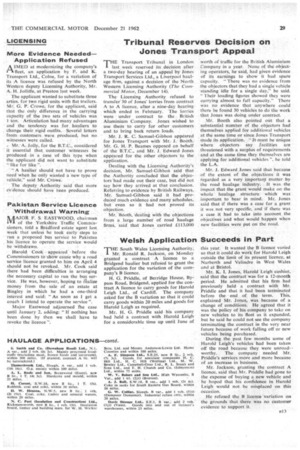Tribunal Reserves Decision on Jones Transport Appeal
Page 31

If you've noticed an error in this article please click here to report it so we can fix it.
THE Transport Tribunal in London last week reserved its decision after a two-day hearing of an appeal by Jones Transport Services Ltd., a Liverpool haulage firm, against a decision of the North Western Licensing Authority (The Corntnercial Motor, December 14).
The Licensing Authority refused to transfer 30 of Jones' lorries from contract A to A licence, after a nine-day hearing Which ended in February: The lorries were under contract to the• British Aluminium Company. Jones wished to use thernto carry for other customers
and 'to bring back return loads. .
Mr. I. R. C. Samuel-Gibbon appeared for Jones Transport with' Mr. J. BoOth, Mr. G. H. P. Beames opposed on behalf of the B.T.C., and Mr. J. Edward •Johes appeared for the other objectors to the application..
Dealing with the Licensing Authority's decision; Mr. Samuel-Gibboti said that the Authority .concluded that the objectors 'had made out their case, but did not say how they arrived at that conclusion. Referring to evidence by British Railways, Mr. Samuel-Gibbon said it had produced much evidence and many schedules, but even so it had not proved its objection.
Mr. Booth, 'dealing with the objection's from a large number of road 'haulage firmS, 'said that Jones carried £113,000
worth of traffic for the British Aluminium Company in a year. None of the objecting operators, he said, had given evidence of its earnings to show it had spare capacity. " There was no evidence from the objectors that they had a single vehicle standing idle for a single day," he said. "Their loading figures showed they were carrying almost to full capacity." There was no evidence that anywhere could there be found 30 vehicles to do the work that Jones was doing under contract.
Mr. Booth also pointed out that a substantial number of the objectors had themselves applied for additional vehicles at the same time or since Jones Transport made its application... "It must be unique where objectors say facilities are threatened with a surplus of requirements and at the same time they themselves are applying for additional vehicles", he told the L.A.
Mr. J. Edward Jones said that because of the extent of the objections it was regarded as a very important matter by the road haulage industry. It was the impact that the grant would make on the whole haulage structure which was important to bear in mind. Mr. Jones said that if there was a case for a grant it was not very specific, and if there was a case it had to take into account the objectives and what would happen when new facilities were put on the road.




















































































